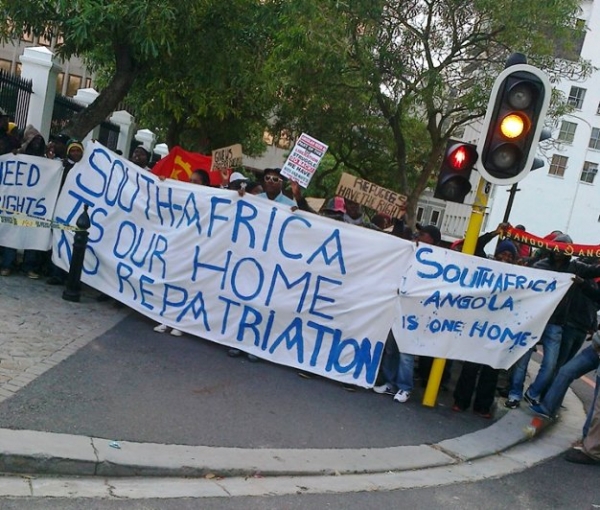

In May 2013, the Angolan community marched from the Cape Peninsula University of Technology to parliament protesting against repatriation. Picture courtesy of Joao Kaputo
23 June 2015
In October 2009, the United Nation High Commissioner for Refugees (UNHCR) proposed to end refugee status for Angolans who fled the civil war which ended in 2002. It recommended member states act in concert to achieve a uniform schedule for the implementation of the cessation of the refugee dispensation.
Following that recommendation, Home Affairs (DHA) offered a special dispensation to Angolan nationals to regularize their stay in South Africa over a 14-week period which ended on 31 August 2013. Some managed to apply for a two year visa, a short term solution to alleviate the crisis. Many of these visas have already expired or are expiring.
On 18 June 2015, GroundUp interviewed Jao Kaputo, an Angolan community leader. He has been begging the department to renew the permits and allow those who did not manage to apply in 2013 to apply.
Kaputo has been a refugee in South Africa since 1994. He received his refugee status in 2006 and has had it renewed five times. He said the cessation of refugee statuses for Angolans started already in 2004, when the Angolan government, UNHCR and South Africa agreed to withdrawal Angolan refugee status.
But the Angolans have struggled with documentation and tried to engage DHA. On 17 March 2004, they protested at the Angolan Embassy. In 2007, they wrote to the director general of Home Affairs, Mavuso Msimang, regarding permanent residence. When they did not succeed, they wrote to then Minister Nosizwe Mapisa-Nqakula to consider the plight of Angolans seeking permanent residence in South Africa. But it was to no avail.
In 2013, following the UNHCR decision, DHA stopped extending refugee statuses of Angolans and the UNHCR washed its hands of the matter.
“We are like hopeless children. The UN handed us to South Africa when our statuses were ceased. The situation now is complicated. We have surrendered to God,” said Kaputo.
“When the temporary permits were issued, we were told by DHA they were just a bridge permit. It is two years now after the permits were issued and DHA hasn’t said anything.”
“We did not pack our bags and come here like other economic migrants. Our homes were bombed. We lost everything, including documents. We are dispersed; our mothers went their own directions, and our fathers the other direction. As a result some of us are not documented, including children born here, and cannot apply for birth certificates.”

Angolan community committee pose for a photo at Salt River Community hall in 2012. From right: chairperson Manuel Bonvo, community member Joao Kaputo and fourth, holding a file, the former presidential election opposition candidate. Picture courtesy of Joao Kaputo.
The Angolans also complain that their consulate is unhelpful.
“They will say we will come back to you and they never contact you,” said Kaputo.
According to Kaputo, the consulate did not have the capacity to interview the refugees or to find out their villages of origins and track their families.
The Angolans started arriving in 1993. After twenty years, they have children born in South Africa who cannot speak Portuguese or any Angolan language. There is also hardly any support in Angola for those who return. Some families do not count them as part of the family because they have been away for a long time.
In 2013, GroundUp interviewed Petro Nzazi (not his real name) and his young brother after they lost their refugee status and left without any identity documents. Last week, Nzazi confirmed he later managed to apply for a two-year work permit through a special dispensation given to Angolan nationals by DHA. But the permit will expire in December and his status is uncertain.
Nzazi says, “Starting over in Angola after 20 years of staying here will be very difficult. I have children at university and others still going to school. If I relocate to Angola, what will happen to them? Many Angolans, whose permits expired already are illegal, maybe deported and they cannot access their bank accounts. I know five people who gave up and went back to Angola. They intend to apply for permits from there, but I am worried they might not be successful because of the strict immigration regulations gazetted on 22 May 2014.”
GroundUp emailed Home Affairs on 19 May, sent a text message and phoned the spokesperson several times. At the time of publishing there was no response.